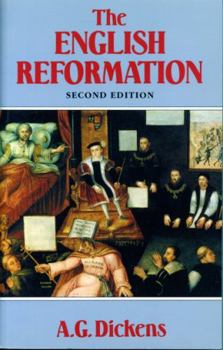The English Reformation
Select Format
Select Condition 
Book Overview
This book presents a new edition of the classic study of the religious changes that transformed England in the sixteenth century. Henry VIII officially brought the Protestant Reformation to England in the 1530s when he severed the English Church from the Papacy. But the seeds of the movement, according to A.G.Dickens, were planted much earlier. The English Reformation, first published in 1964, follows the movement from its late medieval origins through...
Format:Hardcover
Language:English
ISBN:0271007982
ISBN13:9780271007984
Release Date:January 1989
Publisher:Penn State University Press
Length:460 Pages
Weight:1.33 lbs.
Dimensions:1.4" x 6.0" x 9.0"
Customer Reviews
4 ratings
great, but....
Published by Thriftbooks.com User , 14 years ago
Dicken's work on the ENglish reformation has been re-worked and in essense overuled. But, it it and always will be a classic. Dicken's does a fantastic job at covering Henry VIII's reformation, and the detail is incredibly dense. However, I do wish his tiny section on Mary I's reign would have been expanded. It is just a short little snipet on the Marian reign, and I think he could have expanded it. However, I think Dicken's was more concerned about the reformed religious groups rather than the catholics. But, the marriage between Mary and Philip certainly opens windows for the many problems during Elizabeth's reign. Overall, its a great book for information on the ENglish reformation, but many of his ideas have been redone by modern scholars and challenged many of the once held views by Dickens. No, I will not jot all them down with a list of recent scholars writing against Dicken's. Im not being paid for this review, so it will suffice for me to say that the work is a classic, and I would also read it with some modern works in sight.
Wonerful Book-must read
Published by Thriftbooks.com User , 17 years ago
A.G. Dickens book, the English Reformation, is one of the most influential books on the Reformation ever written, and this fact makes an evaluation very difficult. For Dickens, the Reformation had much less to do with the divorce of Henry VIII than with the corruption and decay of the Catholic Church and the rising expectations of a literate, educated laity. When Protestantism emerged, according to Dickens, it was rapidly taken up by the average Englishmen who was tired of Catholic ritual and hungry for preaching and direct experience of reading Scripture. There was a "magnetic process" that attracted the English to Protestantism because of its intrinsic merits, something that Dickens argues makes it a viable religion today (81). That Dickens' argument found a warm reception in the twentieth century should come as no surprise, for it made the Reformation not an act of state--imposed by fiat on an unwilling populace--but the natural progression of a literate, rational, hence modernizing society. To make his argument, Dickens relies on varied primary and secondary source material, ranging from parish records, prayer books, to the state papers of Henry VIII, and even the memoirs of a Venetian ambassador in England. However, Dickens' favorite and most problematic source is doubtless John Foxe's propagandistic martyrology, The Acts and Monuments (1563). Foxe an early Protestant who saw first hand the Marian persecutions, recounts the history and the development of the English Church from the time of John Wycliffe through the "Marian reaction" to Elizabeth I. Dickens shows the English Reformation to be "an integral part of the European movement," which was propelled by the new learning of the Renaissance (13). Its emphasis on philology and history revealed the medieval church's estrangement from biblical teaching and, therefore, deviation from the teachings of the purer, early Christian church. According to Dickens, this humanist critique foreshadowed the later criticisms by Lutheran reformers against the "superstitious" doctrines of the medieval church and the authority of the papacy. The emphasis on history and Scripture inherent in humanism superseded churchly, Aristotelian, scholasticism. Dickens shows that this spirit of reform found a warm reception in England, as the followers of John Wycliffe were already advocating a Bible-based Christianity and denouncing the hierarchical corrupt Catholic Church. That Lollardy was a precursor to the Reformation, according to Dickens, is indisputable, but rampant anti-clericalism among all social classes also contributed to the ground swell of popular sentiment against the Catholic Church. The Catholic Church after all, according to Dickens, was in total decay, which contributed to England's inevitable happy separation. In Dickens, the bishops and higher clergy were secular figures and solely concerned with enriching themselves at the expense of the parishioner: Christian teaching was dismissed and the Catho
Much needed, well researched, a little boring
Published by Thriftbooks.com User , 20 years ago
Closer to 3.5 stars.To learn that the English Reformation had its own history rather than one piggybacking off of that of Germany and France is invaluable. The examination of characters such as Wycliffe, the Lollards, and other precursors to the Reformation was great.I understand that the type of research Dickens did concerning land ownership, wills, etc. is not exactly stimulating to read about, but I wish he would have written in a slightly more enjoyable manner.
My Favourite Course Book
Published by Thriftbooks.com User , 25 years ago
Although this was not one of my tutor's recommended "books to buy" I have bought it anyhow. Although Dickens' descriptions of The English Reformation are, at times, simplistic, this book is invaluable for gaining an overview of what was going on during the period. I recommend it to any college student, as a springboard to more weightier tomes.






